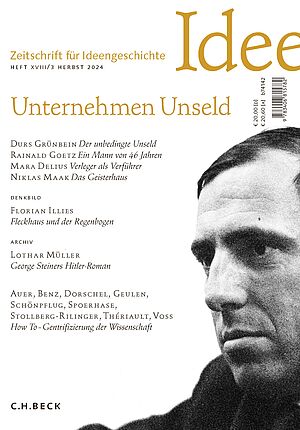
Andreas Dorschel, Dr. phil.
Professor für Ästhetik
Universität für Musik und darstellende Kunst Graz
Geboren 1962 in Wiesbaden, Deutschland
Studium der Philosophie, Musikwissenschaft und Germanistik an der Johann Wolfgang Goethe-Universität Frankfurt und der Universität Wien
Project
Die Zeit des Tragikomischen. Eine philosophische Untersuchung
In dem eher bescheidenen Schrifttum über Tragikomik gibt die Literaturwissenschaft den Ton an. Ihr Interesse hat sich darauf konzentriert, die Tragikomödie als eigenes Genre zu etablieren. Gegenüber jedem solchen Versuch, in eine Gattung zu fassen, was schon vom Namen her die Grenzen solcher überschreitet, gibt es vielleicht einen aufschlussreicheren Zugang: "Das Tragikomische" ist keine Sondersparte dramatischer Literatur - es begegnet wie in der Kunst so auch im außerkünstlerischen "Leben". Für Letzteres könnte die Psychologie zuständig sein; sie indes stipuliert einfach, Tragikomisches müsse eine Mischung aus Tragischem und Komischem sein. Doch diese Vorstellung weicht der Schwierigkeit aus, dass Tragisches und Komisches ja nicht einfach nur verschieden voneinander sind, sondern einen Gegensatz bilden. Was die Wissenschaften als selbstverständlich voraussetzen, muss die Philosophie eigens zum Gegenstand einer Frage (oder auch vieler) machen: Solche philosophische Aufmerksamkeit hat die Kategorie des Tragikomischen gerade sehr nötig. Sie wird an dessen Zeitstruktur ansetzen müssen. Zwei Verhältnisse lassen sich zunächst idealtypisch einander gegenüberstellen. Die eine Vorstellung des Tragikomischen - historisch wohl die ältere - ist die sukzessive. Komisches wechselt sich mit Tragischem ab, sodass jenes Erleichterung - "comic relief" - von diesem verschafft, oder Tragisches wendet sich ins Komische, in finale Erleichterung eines "happy end". Die andere - wohl historisch spätere - Vorstellung fasst es simultan: Es gilt, das Komische am oder im Tragischen zu entdecken. Und dieses Komische kann, statt Erleichterung ("relief") vom Tragischen zu verschaffen, dieses vielmehr schärfen, schmerzhaft zuspitzen. Doch solche Entgegensetzung - ein Pol, ein Gegenpol - ist nur ein erster Ausgangspunkt, von dem her der Gedanke sich auf unabsehbare Komplikationen einlassen muss.Lektüreempfehlung
Dorschel, Andreas. Rethinking Prejudice. London, New York: Routledge, 2019.
-. "Music and Pain." In The Oxford Handbook of the New Cultural History of Music, herausgegeben von Jane Fulcher, 68-79. New York: Oxford University Press, 2011.
-. Verwandlung: Mythologische Ansichten, technologische Absichten. Göttingen: Vandenhoeck & Ruprecht, 2009.
Colloquium, 15.12.2020
N's mishap, or: Is this tragicomic?
'Tragic' and 'comic' emerged in classical Greece as important terms, pertaining to religion, theatre, self-understanding. Strikingly, 2500 years later, they have persisted. No less strikingly, they have also been combined. Yet 'tragicomic', I will attempt to argue in my larger project, is a label under which a host of things have been lumped together. To understand the differences may help us to understand the phenomena to which that label has been applied. As I haven't got an overview of the larger project myself - it develops as I go along and takes unexpected turns all the time -, I will present no tour d'horizon, but rather a fragment of one chapter. In it, I take a tiny sketch for a story by Anton Chekhov, penned in 1901, as point of departure for one such distinction. This is still very much work in progress, tentative and probably beset with mistakes. - Because time is short, I have to skip
6-9; however, for discussion purposes, the issues are indicated in the Analytical Table of Contents below (viz.: consciousness; genre; interpretation).
Analytical Table of Contents
1 'Tragicomic': the question and a potential example.
2 'Tragicomic': Tragic and comic qualities not juxtaposed but intertwined.
3 Contrasting qualities weaken each other anyplace else, so why should it be different with 'tragic' and 'comic'?
4 Solution: The paradox resolves itself when one distinguishes between an internal and an external perspective.
5 Critique of the solution (
4): Also approached from an external perspective, tragic and comic features can, instead of weakening each other (as might be expected), strengthen one another.
[SKIP 6 Objection: Tragic and comic features cannot coexist (at the same time) in a person’s consciousness.]
[SKIP 7 It helps if we keep apart the objection (
6), on the one hand, and the question whether there is/was/can be a genre 'tragicomedy', on the other.]
[SKIP 8 Response to the objection (
6): In order to seem plausible, the objection must skew consciousness.]
[SKIP 9 Counter-objection: To call something tragicomic is mere interpretation. Response: There is nothing unusual in this.]
10 'Tragic' and 'comic' related to feeling and thought.
11 In terms of interpretation (
9), is there a meaning for 'tragic' that applies to the example? 'Sad-and-comic' vs. 'tragicomic'.
Publications from the Fellow Library
Dorschel, Andreas (Stuttgart, 2023)
Dorschel, Andreas (Hamburg, 2022)
Mit Entsetzen Scherz : die Zeit des Tragikomischen
Dorschel, Andreas (Hamburg, 2021)
Wortwechsel : zehn philosophische Dialoge
Dorschel, Andreas (New York, 2020)
Dorschel, Andreas (Stuttgart, 2016)
Abhängige : von Gnaden einer Person, von Gnaden einer Sache
Dorschel, Andreas (Cambridge [u.a.]Cambridge University Press, 2015)
Passions of the intellect : a study of polemics
Dorschel, Andreas (München, 2014)
Wunderglaube und Mißtonleiter : Aufsätze und Vorträge
Dorschel, Andreas (Paris, 2013)
Aesthetics of conducting : expression and gesture






